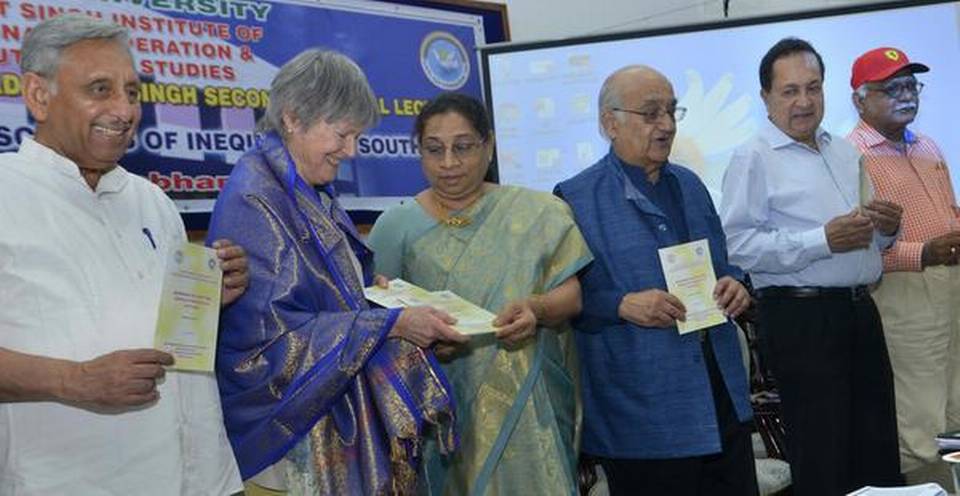Published in The Hindu on Tuesday, 18 April 2017
Delivering the second Madanjeet Singh memorial lecture at Pondicherry University

The setting up of a 21st century agrarian reforms commission and providing access for the rural populace to tangible assets and initiating electoral reforms will be key to address the growing problem of inequality, noted Bangladeshi economist Rehman Sobhan said here on Monday.
Delivering the second Madanjeet Singh memorial lecture on ‘Structural sources of inequality in South Asia at the Pondicherry University, Mr. Sobhan also called for making workers in the farm and manufacturing sectors equity partners and providing better quality education in institutions run by the government.
Advocating the need to “address the sources of inequality than the symptoms”, Mr Sobhan, who is also the chairman of Centre for Policy Dialogue, Dhaka, has identified the key sources of economic disparity as inequitable access to productive assets, unequal participation in markets, educational disparities, inequitable access to health care and unfair globalisation.
Unless the governments address the source of inequality, mass deprivation would continue to hound South Asian countries. Interestingly, he said, even inequality had become a topic of discussion in West as well as United States.
The economic intervention programmes such as employment guarantee schemes, welfare pensions and subsidies has helped reduce poverty but then inequality and social disparity have widened in the region, he said.
“The poor continue to remain vulnerable to the vicissitudes of the market and mal-governance. Business elites have emerged as the dominant social force in every county of South Asia with a corresponding weakening, with a few significant exceptions in the authority of the State,” he said.
Agrarian reforms, which were once an important political concern across South Asia, had gone of the radar of policy makers for at least three decades. “Even within the prevailing inequitable social dispensation across South Asia, there is no reason why we cannot explore Agrarian reforms which are politically feasible as well as economically sustainable. A 21st century agrarian reforms commission is the need of the hour,” he said.
He also suggested making it mandatory to offer equity stake in the value addition process. “It’s actually making a farmer a business partner of the corporate entity who finally sells his farm produce,” he said.
Similarly, when land was acquired for industrial purpose the owner should be given an equity stake in the company so that he could have a long-term source of income, he said.
Mr Sobhan said the ultimate aim should be to move towards a common school system which provides high quality public education such as the one followed in China, South Korea, Japan and European countries.
Chairman of Kasturi and Sons Limited N. Ram, who is also president of Madanjeet Singh Foundation, said it was unacceptable to have a large segment of the society with mass deprivation. He also outlined the need to promote understanding and opportunities by South Asian countries. South Asia has several problems despite having resources, talent and excellent institutions. And this, he said had put us in a disadvantageous position. He also urged people to avoid jingoism that would create disharmony among countries.
Chairperson of South Asia Foundation (SAF) Mani Shankar Aiyar in his address stressed the need for democratic equality while ensuring growth.
Others who participated included Vice-chancellor (officiating) Pondicherry University, Anisa Basheer Khan and France Marquet, representative of SAF to UNESCO.
Published in Press Trust of India on Tuesday, 18 April 2017
Address source of inequality: Bangladeshi economist
Puducherry, Apr 17 (PTI) Access to rural population to tangible assets and making farm and manufacturing sector workers equity partners are key factors in addressing “growing problems of inequality,” noted Bangladeshi economist Rehman Sobhan today said.
Also, establishment of a 21st century Agrarian Reforms Commission and the “need to address the sources of inequality” were important, said Sobhan, who is chairman of Centre for Policy Dialogue (Dhaka-Bangladesh).
He was delivering the “UNESCO Goodwill Ambassador Madanjeet Singh second memorial lecture on addressing the structural sources of inequality in South Asia” at Pondicherry University here.
“Establishment of an agrarian reforms commission, providing access for rural population to tangible assets, ensuring better quality education in institutions run by the government and also electoral reforms” are key factors needed to address the growing problems of inequality, he said.
“Even within the prevailing inequitable social dispensation across South Asia there is no reason why we can’t explore agrarian reforms which are politically feasible as well as economically sustainable,” he said.
Economic intervention programmes by the governments across South Asia such as employment guarantee schemes, welfare programmes and subsidies had helped reduced poverty, “but inequality and social disparity have widened in the region,” he said.
Suggesting mandatory offering of equity stake in the value addition process, he said, “it is actually making a farmer a business partner of the corporate entity which finally sells his produce.”
The ultimate aim should be to move towards a “common school system which provides high quality public education.”
Chairman of Kasturi and Sons Limited and President of Madanjeet Singh Foundation N Ram outlined the need for South Asian countries to promote understanding.
Chairperson of South Asia Foundation (India chapter) Mani Shankar Aiyar, Vice-Chancellor (officiating) of Pondicherry University Anisa Basheer Khan and Representative of the South Asia Foundation to UNESCO France Marquet were among those who spoke.


